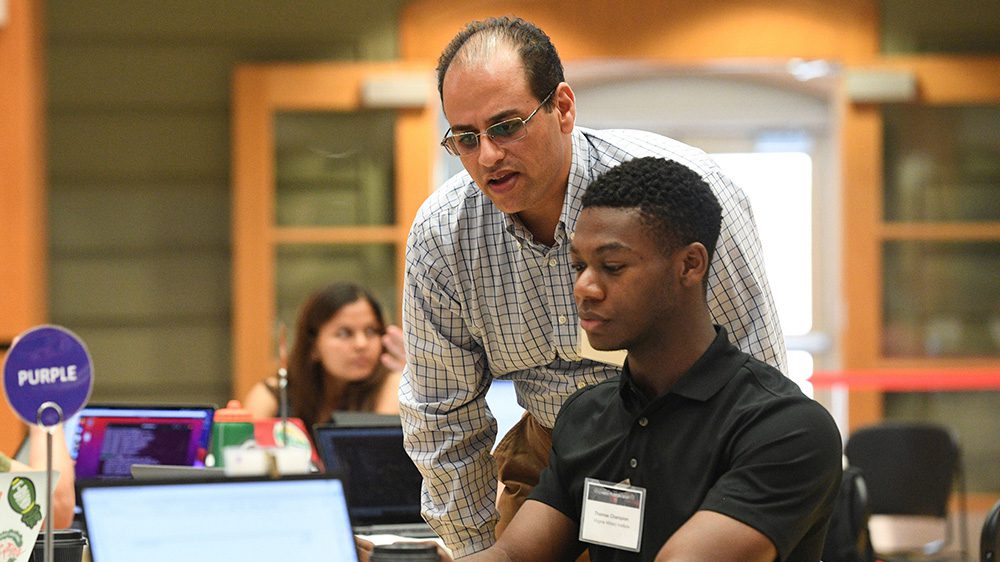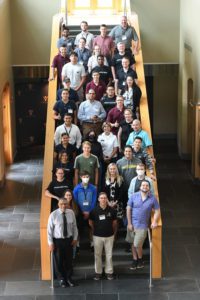VMI Hosts Senior Military College Cyber Fusion

Mohamed Azab, Ph.D., assists Cadet Thomas Champion II ’23 during the Cyber Fusion conference held in Marshall Hall Aug. 2-3.—VMI Photo by H. Lockwood McLaughlin.

Mohamed Azab, Ph.D., assists Cadet Thomas Champion II ’23 during the Cyber Fusion conference held in Marshall Hall Aug. 2-3.—VMI Photo by H. Lockwood McLaughlin.
Approximately 35 attendees, most students and faculty members from the nation’s six senior military colleges, participated in Senior Military College Cyber Fusion 2021, a first-of-its-kind conference held on post Aug. 2-3.
The gathering, which was designed to introduce the field of cybersecurity and stress its critical importance to students from a variety of majors, was modeled on Commonwealth Cyber Fusion, an event for college students that’s been held at VMI for the past five years. Hosting the competition was VMI’s Cyber Defense Lab, which was begun last fall thanks to a Department of Defense grant establishing such laboratories at all the nation’s senior military colleges. In addition to VMI, those institutions are Virginia Tech, The Citadel, the University of North Georgia, Norwich University, and Texas A&M.
On the first day of the conference, attendees heard talks from a wide variety of experts within the cybersecurity field, among them keynote speaker Deborah Frincke, Ph.D., associate laboratory director for national security sciences at the Oak Ridge National Lab. They also gathered into groups, where they were asked to solve cybersecurity challenges from the perspectives of leaders such as a chief executive officer, chief information officer, and chief financial officer.
“They’re placing us in real-world scenarios by saying, ‘You are the leader of your specific organization,’” said Cadet John Barker ’23, a cadet attendee. “It’s like trying to virtually run a business without the consequences of making a wrong choice.”

Representatives from the six senior military colleges, Norwich University, Texas A&M, The Citadel, University of North Georgia, Virginia Tech, and VMI, participate in the Cyber Fusion conference held in Marshall Hall Aug. 2-3.—VMI Photo by H. Lockwood McLaughlin.
On the second day, participants took part in a capture the flag competition. This event was a Jeopardy-style competition in which five teams solved individual challenges of various point values across different categories to score points.
The University of North Georgia won this year’s event and took home the Senior Military College Cyber Trophy. A combined team of students from Norwich and Virginia Tech took second, and the VMI team placed third. Representing VMI were Barker, Cadet Jordan Beck ’23, Cadet Thomas Champion II ’23, Cadet Joseph Kolly ’23, Cadet Aidan Noonan ’24, and Cadet Alex Rodriguez ’22. The faculty advisor was Mohamed Azab, Ph.D., assistant professor of computer and information sciences.
Acting as a facilitator for one of the conference’s activities was Bryce Bucklin ’17, whose efforts as a cadet led to VMI’s first Commonwealth Cyber Fusion event in 2017. Bucklin, now a senior penetration tester at Coalfire, a cybersecurity consulting firm, emphasized that protecting digital infrastructure is vital to the nation’s future.
“This field is really, really important,” said Bucklin. “You hear about hacking every single week now. It’s so tremendously important and needed.”
It’s especially important for those planning military careers, Bucklin believes. “These [students] are our future military leaders,” he said.
Bucklin can even see a time in which the United States has a standalone branch of the military dedicated to cybersecurity.
“We have so many cyber units that eventually someone is going to want to consolidate them into a branch,” he said. “[Today’s cadets are] going to be the lieutenants, the majors, the colonels, the generals in this new cyber branch.”
Agreeing with the importance of cybersecurity education was Col. Mohamed Eltoweissy, Ph.D., head of VMI’s computer science department and director of the Institute’s Cyber Defense Laboratory.
“This is the Department of Defense and the senior military colleges coming together to prepare the leaders of the future in cybersecurity,” said Eltoweissy of the conference. “There’s a great gap in cybersecurity talent … The senior military colleges are best qualified for developing leaders of the future.”
According to Eltoweissy, cybersecurity is a constant pursuit of trying to outwit hackers. “As we are evolving our defenses, we also know that hackers are evolving their strategies and their algorithms,” he said. “We are using AI and our data analytics, and they are doing exactly the same thing. We have to develop solutions, assuming and knowing that hackers are inside our networks.”
It’s also vital to have a mindset that cybersecurity isn’t just for individuals who work in the field of information technology.
“Students and faculty and almost everyone need to be immersed in cybersecurity and have the mentality that things have to be protected and secured all of the time,” said Eltoweissy. “Security is like brakes on a race car. It’s not there to make us stop. It’s there to make us have confidence for speed.”
Others who made this conference possible include staff from the Center for Leadership and Ethics, Chelsea Bendick, David Jones, and Cadet Sibi Bagavathy ’23.